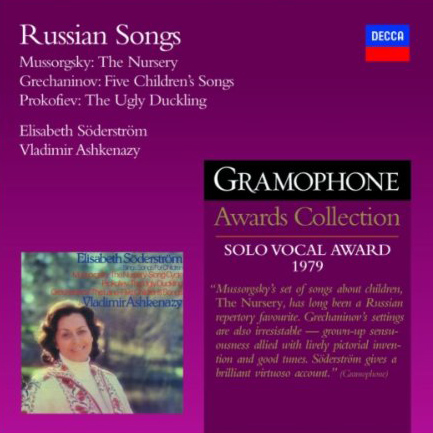Russian Songs – Songs for Children
View record and artist detailsRecord and Artist Details
Composer or Director: Modest Mussorgsky, Sergey Prokofiev
Genre:
Vocal
Label: Decca
Magazine Review Date: 07/1979
Media Format: CD or Download
Media Runtime: 36
Mastering:
ADD
Catalogue Number: 476 2511

Tracks:
| Composition | Artist Credit |
|---|---|
| (The) Nursery |
Modest Mussorgsky, Composer
Elisabeth Söderström, Soprano Modest Mussorgsky, Composer Vladimir Ashkenazy, Piano |
| (The) Ugly Duckling |
Sergey Prokofiev, Composer
Elisabeth Söderström, Soprano Sergey Prokofiev, Composer Vladimir Ashkenazy, Piano |
Author:
Music which is in some sense 'about' children is different from music designed 'for' children, but both are originally 19th-century inventions which have taken on a new character and a new importance with the conscious cult of the child. There is too often a note of archness or sentimentality in the 19th-century attitude to children (not absent entirely from Schumann's Kinderszenen or Bizet's Jeux d'enfants) but Mussorgsky almost completely avoids both in these songs. Even "At bedtime", which sails near the wind, is a very long way from "Christopher Robin" by A. A. Milne. It is their realism that saves these Nursery Songs, and Elisabeth Söderström emphasizes this by her lifelike distinction between child and nanny. She darkens and 'ages' her tone-colour and her verbal enunciation with great skill and enunciates her (Russian) words with excellent clarity, which in its turn communicates itself to her vocal production.
Ashkenazy is an admirable pianist and makes the piano part of the Nursery Songs vividly illustrative. Like most soloists playing with a singer, he is inclined on occasion to make the piano part too prominent (notably in "The Beetle" and "The Hobby-Horse", where the tempo also seems unrealistically fast and suggests a motor-bicycle rather than a horse). Prokofiev's Ugly Duckling almost amounts to a solo cantata and the musical setting is absolutely in Mussorgsky's manner, which Prokofiev never employed again. In fact without a text (and a translation - both happily supplied with this disc) this is almost impossible to follow, every change of tempo and rhythm being determined by the dramatic development of the story, which is Hans Andersen's adapted by the composer himself. Gretchaninov's Five Children's Songs date from 1920 and are less paintakingly realistic than Mussorgsky, though strongly influenced by him. The third of these songs ("The Lane") and the fifth ("Wind's Lullaby") show the singer's perfect vocal control at pianissimo and the exquisite clarity of tone and enunciation.
Discover the world's largest classical music catalogue with Presto Music.

Gramophone Digital Club
- Digital Edition
- Digital Archive
- Reviews Database
- Full website access
From £8.75 / month
Subscribe
Gramophone Full Club
- Print Edition
- Digital Edition
- Digital Archive
- Reviews Database
- Full website access
From £11.00 / month
Subscribe
If you are a library, university or other organisation that would be interested in an institutional subscription to Gramophone please click here for further information.




